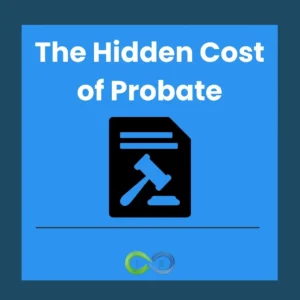The Reality of Intestate Succession
Dying without a will is inexcusable because of how easy it is to create a simple will. However, proper estate planning involves much more than a simple will. When someone dies without a will (intestate), state laws dictate asset distribution through a court-driven process that often creates delays, costs, and unintended outcomes.
We’ve all heard stories about bitter disputes erupting between family members fighting over a deceased relative’s assets. We like to think that sort of thing would never happen in our own families, but the truth is it happens all the time in all kinds of families.
For example, one sibling insists that Mom wanted her to have the beautiful engagement ring she wore all her life, but the other siblings want it, too. Next thing you know they’ve been in probate court for more than a year and have spent significantly more in legal fees than the ring’s objective value. Wouldn’t it be nice if Mom had left a will specifying who she wanted to inherit the ring?
(In truth, even with the best estate planning using a living trust, there is still a possibility that your estate will be litigated upon your death. That is the unfortunate reality when money is involved. However, you can take steps today to help prevent this. The first step would be to make sure you have a will.)
THE ULTIMATE FREE DOWNLOAD
The Estate Planners Tactical Guide
Essential Legal Protection for Achievers

Understanding Intestate Succession vs. Having a Will
When someone dies intestate, there will be no official record of how they wanted their assets to be distributed, so state intestate succession laws kick in. Instead of getting to decide who gets what, the deceased has left the decision up to the state legislature.
Intestate succession occurs when no valid will exists, triggering state laws to distribute assets to surviving relatives in a fixed order (spouse → children → parents → siblings). Courts appoint administrators to manage asset distribution after creditors are paid.
In contrast, testate estates follow the deceased’s explicit wishes in a will, bypassing rigid legal formulas. Wills also allow appointing executors and guardians for minor children, reducing court involvement.
State Variations Make Matters Worse
Intestacy laws vary from state to state – sometimes significantly – but intestacy laws are generally designed to favor the deceased’s closest living relatives.
For example, in California, a spouse inherits 100% of community property, while children inherit separate property. In Texas, a spouse inherits all if no descendants; otherwise, assets split with children. And in New York, a spouse receives $50,000 plus 50% of the remainder, while children split the rest.
A surviving spouse inherits a large portion (or all) of the estate and may be entitled to a “spousal share” even if there is a will. If the spousal share provided by state law is less than 100%, the remainder is divided among the deceased’s children or sometimes surviving parents.
A former spouse usually does not receive anything from an intestate estate, though, if a divorce is pending but has not been finalized, a judge may have to decide whether the spousal share is owed.
The Rigid Hierarchy of Intestate Succession
After spouses, the next preferred class is the deceased’s children. If there is no surviving spouse, the entire estate is divided among surviving children in equal parts. Adopted children are treated the same as biological children, though step-children usually do not receive a share.
Many states recognize a “right of representation,” which means if a member of a group that is inheriting from an estate has already died, the deceased group-member’s heirs receive his or her share.
So, for example, if someone dying intestate had four children and no surviving spouse, each child would be entitled to a quarter share of the estate. If one of the four children had already passed away, the deceased child’s children (the deceased’s grandchildren) would divide the deceased child’s share.
If the departed has no surviving spouse or children, intestate laws next turn to parents and siblings. Half-siblings usually have the same inheritance rights as full siblings, though step-siblings do not.
If there are no surviving parents or siblings, aunts/uncles and nieces/nephews come next, then more distant relatives. If the deceased has no surviving relatives at all, the estate will “escheat” to the state government.
The Limitations of Intestate Succession
Although intestate succession laws are intended to estimate what a deceased individual would have wanted, they don’t provide any flexibility. Non-family members and step-children do not receive any inheritance.
So, if you have a romantic partner to whom you are not married, or a step-daughter with whom you are very close, you will need a will if you want them to receive anything from your estate.
In some states, common law marriage laws allow inheritance rights to a long-term partner, but he or she will have to prove that all of the legal requirements have been met for the relationship to be recognized. Otherwise, bequests to non-relatives, or to charity, require a will.
The Probate Process Without a Will
As a small aside, it is important to understand that having a will does not avoid probate. And dying without a will guarantees that your estate will have to go through the probate process, with the probate court deciding who will be the personal representative of your estate.
During probate, a court supervises the executor to ensure the will’s wishes are carried out properly. While necessary in many cases, probate can be time-consuming and costly, depending on the complexity of the estate and local laws. Many estate planning strategies focus specifically on avoiding probate due to these potential delays and expenses, which can significantly reduce the value of an estate before beneficiaries receive their inheritance.
Assets with designated beneficiaries, such as life insurance policies or retirement plans, typically bypass probate. This is one reason why coordinating your will with your overall estate plan is so important—it allows you to strategically position assets to avoid the probate process when possible while ensuring your wishes are still carried out.
Key Complications of Dying Intestate
Dying without a will creates several serious problems:
- Family conflicts: Relatives may dispute inheritances, especially in blended families.
- Increased costs: Legal fees and court costs reduce estate value.
- Delays: Probate can take months or years, freezing assets.
- Unintended heirs: Estranged relatives or the state may inherit instead of preferred beneficiaries.
Cautionary Tales: Famous People Who Died Without Wills
The consequences of inadequate will planning are illustrated by these high-profile examples:
- Aretha Franklin: Died intestate in 2018 with an $80 million estate. Four sons, a niece, and the IRS battled over debts and taxes, costing millions in legal fees.
- Prince: No will led to a 6-year legal battle among siblings, with $156 million in estate taxes owed. Assets were divided equally after court rulings.
- Abraham Lincoln: Died without a will; his estate was divided between his wife and sons under 1865 Illinois law.
The Benefits of Having a Will
1. Make Specific Bequests
A will can provide for specific bequests of specific property and adjustments to the portions each heir receives. A daughter who sacrificed to be a caretaker in the deceased’s final years receives the same portion of an intestate estate as her sister on the other side of the country who doesn’t even call on Mother’s Day.
If you want the caretaker daughter to receive a greater share, or if you want to leave that antique car in the garage to the favorite nephew who spent years helping you restore it, you better have a will.
2. Avoid Family Infighting
A will can also avoid intra-family squabbles by explicitly declaring who will receive a prized family heirloom, like the engagement ring in our first example. The kids might not like or agree with the testator’s decision, but they will be less tempted to argue about it in court with a will in place.
Even more, if the beneficiaries of an intestate estate can’t agree on who should receive the heirloom, the estate administrator might have no choice but to sell it and divide the proceeds.
Bottom line, with a will, you can make sure heirlooms stay in the family and that any items with sentimental value go to the person most likely to appreciate them.
3. Choose Your Own Executor
When you write a will, you get to choose the executor of your estate. You can pick someone you know is competent and can be trusted.
But the administrators of intestate estates are appointed by a judge applying state law. Usually, the judge appoints the surviving spouse or an adult child of the deceased, but the judge has no way of knowing who is responsible and capable of performing the job. And the kids might argue over who should be appointed as administrator. Once again, a will helps nip potential conflicts in the bud.
4. Establish a Testamentary Trust
Another advantage of a will is that wills can establish testamentary trusts. When an heir receives an inheritance under intestate succession laws, there are essentially no strings attached. Creating a last will and testament , though, can set up trusts that ensure that an inheritance is used responsibly.
If an heir is disabled, a large inheritance could disqualify him or her from receiving benefits. A special needs trust funded by a will can prevent the inheritance from affecting the disabled heir’s benefits.
Or, if you have a beloved pet, you can set up a trust to provide for it. Animals cannot inherit assets, but a will can direct that assets be placed in trust, with the trustee charged with using the assets to take care of the pet (the trustee must agree to the arrangement).
5. Determine Custody of Minor Children
Perhaps most important of all for the parents of minor children, a will can declare who receives custody of children upon the testator’s death.
If a parent dies intestate, custody is up to the court. The judge will try to do what is in the “best interests of the child,” with a preference for close relatives with existing relationships with the child.
But, the judge doesn’t know the child and the family as well as the deceased did. And grieving over a lost parent is hard enough for children without having to deal with the uncertainty of having relatives arguing over custody.
6. Express Your Wishes for Final Arrangements
For some people, disposition of their last remains is just as important as distribution of assets.
In a will, you can express your wishes as to how your funeral and/or memorial service will be conducted, and you can state if you want to be buried, cremated, donate your remains to scientific research and whether you want to be an organ donor.
If you die intestate, the estate administrator may not know what you would have wanted. A will avoids any confusion.
Special Considerations for Complex Family Situations
Modern families come in many forms, and intestacy laws haven’t kept up:
- Unmarried partners: Receive nothing under intestacy laws unless legally recognized.
- Blended families: Stepchildren without legal adoption are excluded.
- Estranged relatives: Biological relatives inherit even if relationships were severed.
The Surprising Statistics
You might be shocked to learn that approximately 60% of Americans die without wills, according to the American Association of Retired Persons (AARP). Younger adults, low-income individuals, and unmarried people are more likely to lack wills.
This means a majority of Americans are leaving their families to deal with the complications, costs, and potential conflicts of intestate succession.
Taking Action Now
The bottom line is hierarchies and percentages established by intestate succession laws are inflexible. Making plans in advance of your death are the only way to make sure your wishes are met and your family is not left to try and make sense of the potential mess you left behind.
Putting it off is easy. After all, nobody wants to think about their own death, and, by the time the will matters, you won’t be around any longer, so what’s the difference, right?
But, the thing is, you need a will and writing a will isn’t something you do for yourself; you do it for your loved ones. A well-drafted will gets rid of the uncertainty about how your property will be distributed and, as a result, helps to prevent family conflicts from arising after your death.
Final Thoughts on Dying Without a Will
Dying without a will can lead to uncertainty, conflict, and additional estate administration expenses and legal fees. Well-written wills, on the other hand, reduce the complexity and expense of estate administration and provide heirs with a clear picture of the testator’s last wishes. It may seem like a low priority since, by the time a will takes effect, the testator is no longer around, but having a will can be instrumental in helping grieving family members resolve the affairs of a deceased loved one.
When you consider all the benefits of having a will and the potential problems of dying intestate, the decision to create a will becomes clear. It’s a simple step that provides significant peace of mind, knowing you’ve done everything possible to make things easier for your loved ones during an already difficult time.





